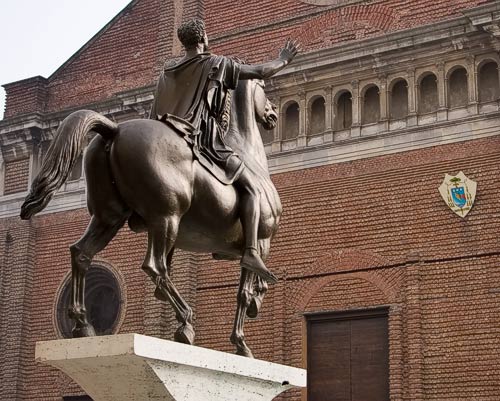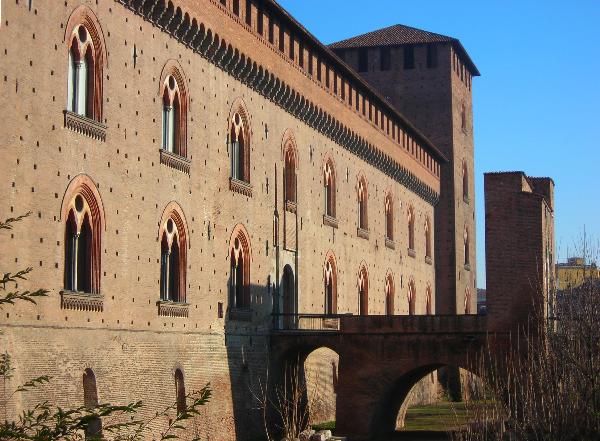Team:UNIPV-Pavia/Pavia/Past
From 2010.igem.org
| Line 24: | Line 24: | ||
[[Image:UNIPV_Pavia_Castello_Visconteo2.JPG|thumb|Visconti Castle]] | [[Image:UNIPV_Pavia_Castello_Visconteo2.JPG|thumb|Visconti Castle]] | ||
In the following centuries Pavia was an important and active town. Under the Treaty of Pavia, Emperor Louis IV granted during his stay in Italy the Palatinate to his brother Duke Rudolph's descendants. Pavia held out against the domination of Milan, finally yielding to the <b>Visconti family</b>, rulers of that city in 1359; under the Visconti Pavia became an intellectual and artistic centre, being the seat from 1361 of the [[Team:UNIPV-Pavia/Pavia/Athenaeum|University of Pavia]] founded around the nucleus of the old school of law, which attracted students from many countries.<br> | In the following centuries Pavia was an important and active town. Under the Treaty of Pavia, Emperor Louis IV granted during his stay in Italy the Palatinate to his brother Duke Rudolph's descendants. Pavia held out against the domination of Milan, finally yielding to the <b>Visconti family</b>, rulers of that city in 1359; under the Visconti Pavia became an intellectual and artistic centre, being the seat from 1361 of the [[Team:UNIPV-Pavia/Pavia/Athenaeum|University of Pavia]] founded around the nucleus of the old school of law, which attracted students from many countries.<br> | ||
| - | <b>The Battle of Pavia (1525)</b> marks a watershed in the city's fortunes, since by that time, the former cleavage between the supporters of the Pope and those of the Holy Roman Emperor had shifted to one between a French party (allied with the Pope) and a party supporting the Emperor and King of Spain Charles V. Thus during the <b>Valois-Habsburg Italian Wars</b>, Pavia was naturally on the Imperial (and Spanish) side. The defeat and capture of king Francis I of France during the battle ushered in a period of <b>Spanish occupation</b> which lasted until 1713 at the conclussion of the War of the Spanish Succession. Pavia was then ruled by the <b>Austrians</b> until 1796, when it was occupied by the French army under <b>Napoleon</b>. During this Austrian period the University was greatly supported by Maria Theresa of Austria and saw a great renaissence that eventually lead to a second renaissance due to the presence of leading scientists and humanists like [[Team:UNIPV-Pavia/Pavia/Vip|Alessandro Volta, [[Team:UNIPV-Pavia/Pavia/Vip|Lazzaro Spallanzani]], [[Team:UNIPV-Pavia/Pavia/Vip|Camillo Golgi]] among others.<br> | + | <b>The Battle of Pavia (1525)</b> marks a watershed in the city's fortunes, since by that time, the former cleavage between the supporters of the Pope and those of the Holy Roman Emperor had shifted to one between a French party (allied with the Pope) and a party supporting the Emperor and King of Spain Charles V. Thus during the <b>Valois-Habsburg Italian Wars</b>, Pavia was naturally on the Imperial (and Spanish) side. The defeat and capture of king Francis I of France during the battle ushered in a period of <b>Spanish occupation</b> which lasted until 1713 at the conclussion of the War of the Spanish Succession. Pavia was then ruled by the <b>Austrians</b> until 1796, when it was occupied by the French army under <b>Napoleon</b>. During this Austrian period the University was greatly supported by Maria Theresa of Austria and saw a great renaissence that eventually lead to a second renaissance due to the presence of leading scientists and humanists like [[Team:UNIPV-Pavia/Pavia/Vip #Alessandro Volta|Alessandro Volta, [[Team:UNIPV-Pavia/Pavia/Vip #Lazzaro Spallanzani|Lazzaro Spallanzani]], [[Team:UNIPV-Pavia/Pavia/Vip #Camillo Golgi|Camillo Golgi]] among others.<br> |
In 1815, it again passed under Austrian administration until the <b>Second War of Italian Independence (1859)</b> and the <b>unification of Italy</b> one year later. | In 1815, it again passed under Austrian administration until the <b>Second War of Italian Independence (1859)</b> and the <b>unification of Italy</b> one year later. | ||
</td> | </td> | ||
Revision as of 13:10, 31 July 2010
|
|
|||||||||||||||||||
|
|
|
|||||||||||||||||
 "
"


